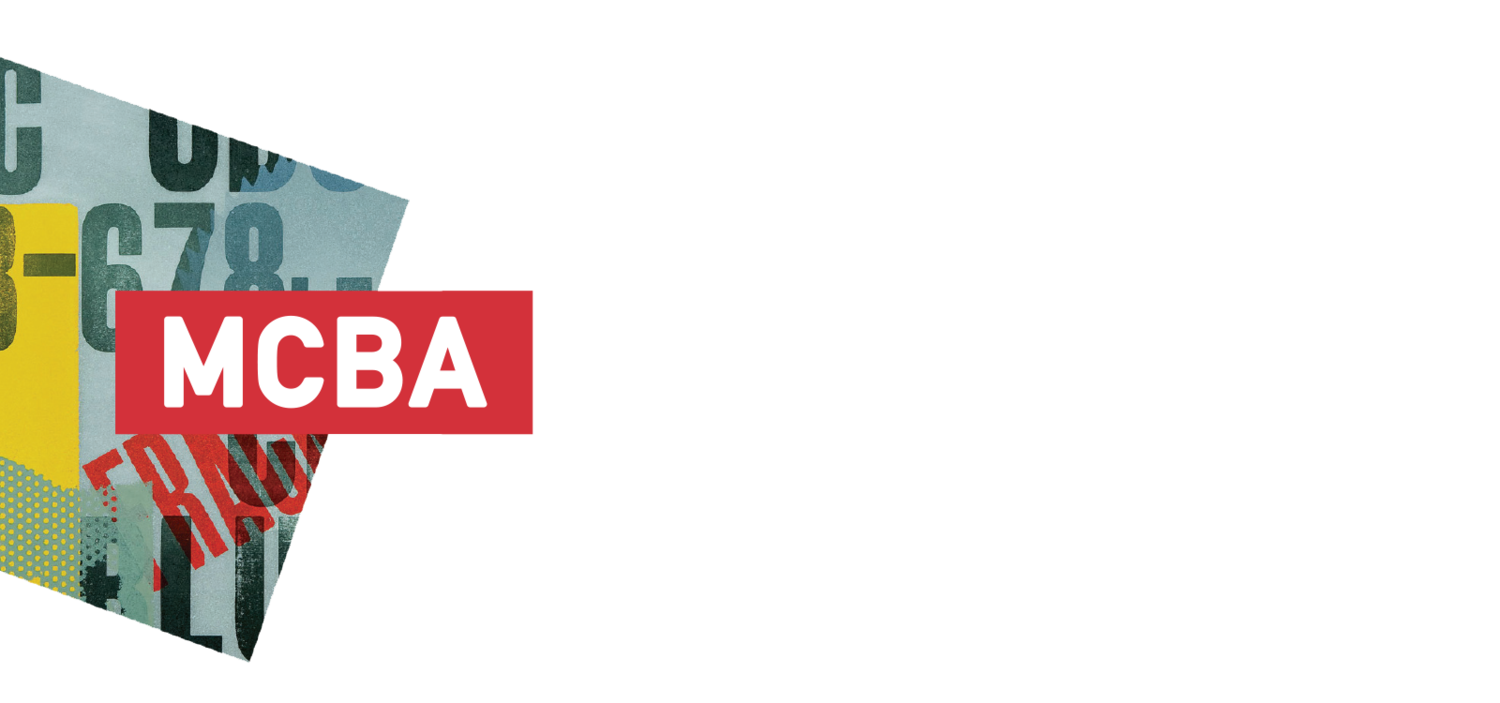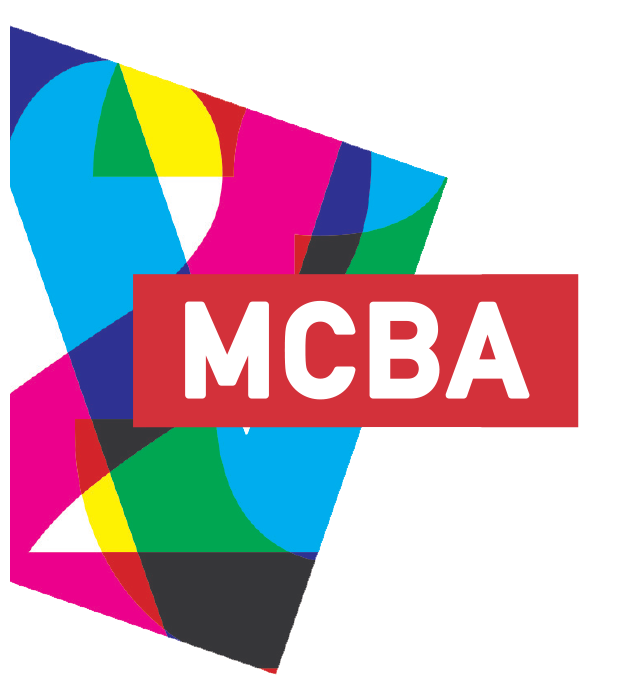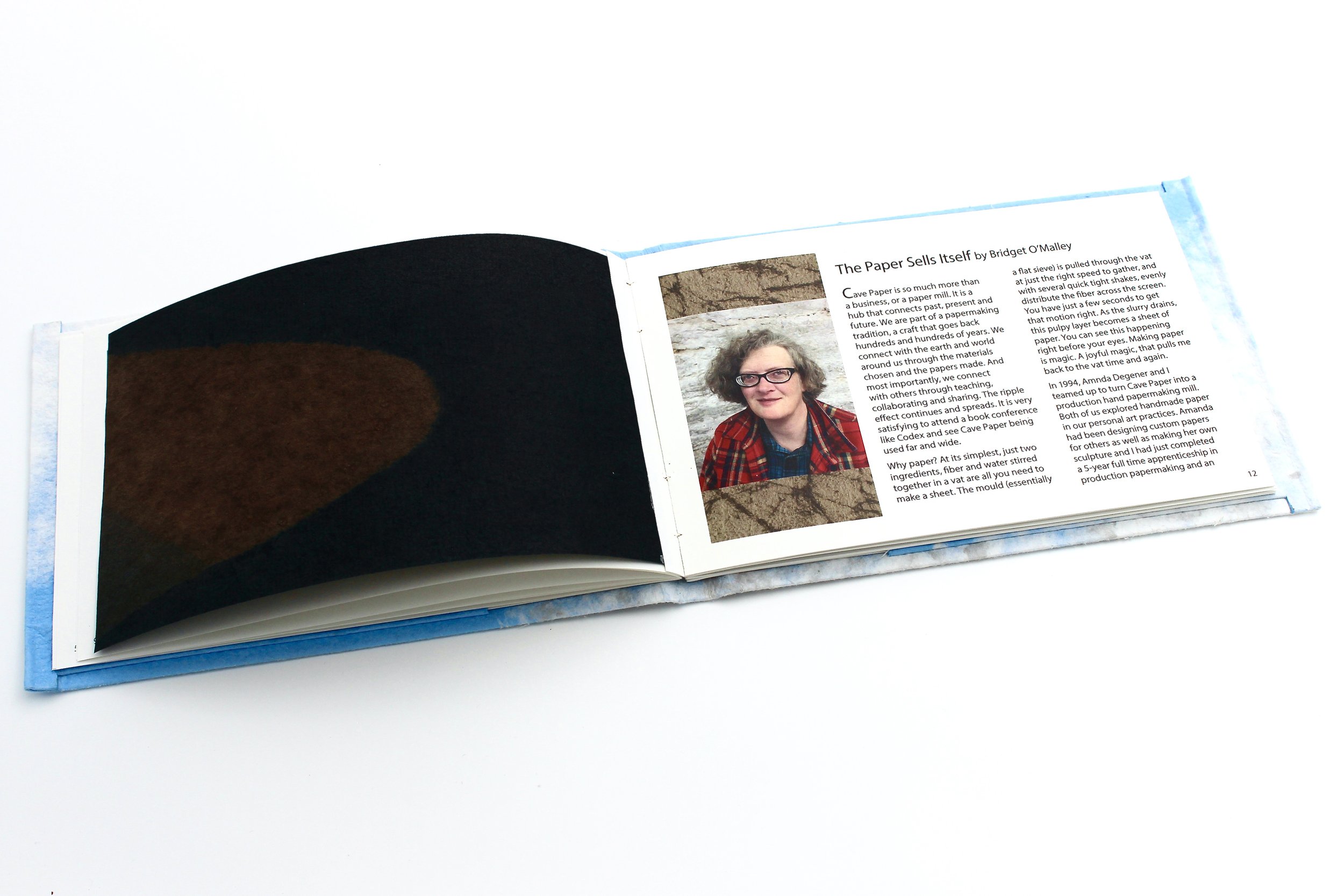Echoes of Loss Artist's Book by Ravikumar Kashi
This piece is a semi-finalist for the 2024 MCBA Prize, and will be included in the 2024 MCBA Prize Exhibition from August 17th - October 12th, 2024. Pieces purchased before the end of the exhibition will ship on October 18th, 2024.
Additionally, this piece is featured in the August 2024 issue of The Fore Edge, a quarterly newsletter from MCBA that highlights new artists’ books and zines for collections, universities, and libraries. If you are interested in receiving this newsletter, there is a sign up available here.
“This work created in cotton rag fibre pulp intertwines themes of loss, language, memory, and cultural globalization.
Handmade paper, with its fibrous texture and imperfections, evokes nostalgia and fragility, mirroring the fading of a mother tongue amidst modernity's tides. Paper was/is also a major carrier of text. Here, paper becomes text instead of text being written on the paper. Paper becomes a metaphor for the state of language itself, delicate and fragile. The process of pulp painting which offers this possibility has been used in my other recent works as well.
India is home to 22 languages that are spoken in different parts of the country. Among them is Kannada, my mother tongue. I studied in a Kannada-medium school until the age of 12 and as such, the language is a deeply ingrained tenet of my early life and remains integral to my understanding and view of the world today.
The concept of language is central to this piece. Particularly the mother tongue, which connects individuals to their heritage. In the face of cultural globalization and homogenization, minority languages are increasingly endangered – especially in the face of the Western hegemony. The increasing economic and social dominance of the English-speaking world is reflected in the use of language, too.
The artwork suggests this erosion, using the delicate nature of handmade paper as a metaphor for its vulnerability. Imprints of letters in the mother tongue, coming apart, eaten away, symbolize the loss of linguistic heritage and cultural identity. It also invokes the sense of obsolescence declared by the archives where old manuscripts are stored and restored.
The uneven edges of the pages echo the white sea-foam of waves along the beach, representing change and continuity. Globalization is a force that is both persistent, yet fluctuating; relentless, and sometimes destructive. Similarly, the sea is silent but impactful, wearing down entire coastlines over unfathomable scales of time.
Additionally, the nature of the work’s construction is such that the words – while derived from remembered fragments of stories and poems in the language – cannot truly be read to form any concrete meaning. It invokes the form and essence of the language rather than a specific narrative. The web-like formation is instead a representation of the history, culture, and idiosyncrasies of Kannada, and its disintegration a reflection of linguistic decay.
This piece tells a personal story of longing for the mother tongue and a collective experience of communities facing similar challenges. It prompts viewers to reflect on the balance between preserving cultural heritage and embracing global interconnectedness. The medium handmade paper becomes an arena where intersecting stories unfold, urging us to cherish and sustain the narratives that define our identities.
In essence, this artwork stands as a delicate testament to the enduring significance of language and memory, capturing the fragile beauty of a world in flux.” -Ravikumar Kashi
94” x 64”
*Consignment item. Not eligible for 10% membership discount. All consignment purchases are final and non-refundable once shipped.
This piece is a semi-finalist for the 2024 MCBA Prize, and will be included in the 2024 MCBA Prize Exhibition from August 17th - October 12th, 2024. Pieces purchased before the end of the exhibition will ship on October 18th, 2024.
Additionally, this piece is featured in the August 2024 issue of The Fore Edge, a quarterly newsletter from MCBA that highlights new artists’ books and zines for collections, universities, and libraries. If you are interested in receiving this newsletter, there is a sign up available here.
“This work created in cotton rag fibre pulp intertwines themes of loss, language, memory, and cultural globalization.
Handmade paper, with its fibrous texture and imperfections, evokes nostalgia and fragility, mirroring the fading of a mother tongue amidst modernity's tides. Paper was/is also a major carrier of text. Here, paper becomes text instead of text being written on the paper. Paper becomes a metaphor for the state of language itself, delicate and fragile. The process of pulp painting which offers this possibility has been used in my other recent works as well.
India is home to 22 languages that are spoken in different parts of the country. Among them is Kannada, my mother tongue. I studied in a Kannada-medium school until the age of 12 and as such, the language is a deeply ingrained tenet of my early life and remains integral to my understanding and view of the world today.
The concept of language is central to this piece. Particularly the mother tongue, which connects individuals to their heritage. In the face of cultural globalization and homogenization, minority languages are increasingly endangered – especially in the face of the Western hegemony. The increasing economic and social dominance of the English-speaking world is reflected in the use of language, too.
The artwork suggests this erosion, using the delicate nature of handmade paper as a metaphor for its vulnerability. Imprints of letters in the mother tongue, coming apart, eaten away, symbolize the loss of linguistic heritage and cultural identity. It also invokes the sense of obsolescence declared by the archives where old manuscripts are stored and restored.
The uneven edges of the pages echo the white sea-foam of waves along the beach, representing change and continuity. Globalization is a force that is both persistent, yet fluctuating; relentless, and sometimes destructive. Similarly, the sea is silent but impactful, wearing down entire coastlines over unfathomable scales of time.
Additionally, the nature of the work’s construction is such that the words – while derived from remembered fragments of stories and poems in the language – cannot truly be read to form any concrete meaning. It invokes the form and essence of the language rather than a specific narrative. The web-like formation is instead a representation of the history, culture, and idiosyncrasies of Kannada, and its disintegration a reflection of linguistic decay.
This piece tells a personal story of longing for the mother tongue and a collective experience of communities facing similar challenges. It prompts viewers to reflect on the balance between preserving cultural heritage and embracing global interconnectedness. The medium handmade paper becomes an arena where intersecting stories unfold, urging us to cherish and sustain the narratives that define our identities.
In essence, this artwork stands as a delicate testament to the enduring significance of language and memory, capturing the fragile beauty of a world in flux.” -Ravikumar Kashi
94” x 64”
*Consignment item. Not eligible for 10% membership discount. All consignment purchases are final and non-refundable once shipped.
This piece is a semi-finalist for the 2024 MCBA Prize, and will be included in the 2024 MCBA Prize Exhibition from August 17th - October 12th, 2024. Pieces purchased before the end of the exhibition will ship on October 18th, 2024.
Additionally, this piece is featured in the August 2024 issue of The Fore Edge, a quarterly newsletter from MCBA that highlights new artists’ books and zines for collections, universities, and libraries. If you are interested in receiving this newsletter, there is a sign up available here.
“This work created in cotton rag fibre pulp intertwines themes of loss, language, memory, and cultural globalization.
Handmade paper, with its fibrous texture and imperfections, evokes nostalgia and fragility, mirroring the fading of a mother tongue amidst modernity's tides. Paper was/is also a major carrier of text. Here, paper becomes text instead of text being written on the paper. Paper becomes a metaphor for the state of language itself, delicate and fragile. The process of pulp painting which offers this possibility has been used in my other recent works as well.
India is home to 22 languages that are spoken in different parts of the country. Among them is Kannada, my mother tongue. I studied in a Kannada-medium school until the age of 12 and as such, the language is a deeply ingrained tenet of my early life and remains integral to my understanding and view of the world today.
The concept of language is central to this piece. Particularly the mother tongue, which connects individuals to their heritage. In the face of cultural globalization and homogenization, minority languages are increasingly endangered – especially in the face of the Western hegemony. The increasing economic and social dominance of the English-speaking world is reflected in the use of language, too.
The artwork suggests this erosion, using the delicate nature of handmade paper as a metaphor for its vulnerability. Imprints of letters in the mother tongue, coming apart, eaten away, symbolize the loss of linguistic heritage and cultural identity. It also invokes the sense of obsolescence declared by the archives where old manuscripts are stored and restored.
The uneven edges of the pages echo the white sea-foam of waves along the beach, representing change and continuity. Globalization is a force that is both persistent, yet fluctuating; relentless, and sometimes destructive. Similarly, the sea is silent but impactful, wearing down entire coastlines over unfathomable scales of time.
Additionally, the nature of the work’s construction is such that the words – while derived from remembered fragments of stories and poems in the language – cannot truly be read to form any concrete meaning. It invokes the form and essence of the language rather than a specific narrative. The web-like formation is instead a representation of the history, culture, and idiosyncrasies of Kannada, and its disintegration a reflection of linguistic decay.
This piece tells a personal story of longing for the mother tongue and a collective experience of communities facing similar challenges. It prompts viewers to reflect on the balance between preserving cultural heritage and embracing global interconnectedness. The medium handmade paper becomes an arena where intersecting stories unfold, urging us to cherish and sustain the narratives that define our identities.
In essence, this artwork stands as a delicate testament to the enduring significance of language and memory, capturing the fragile beauty of a world in flux.” -Ravikumar Kashi
94” x 64”
*Consignment item. Not eligible for 10% membership discount. All consignment purchases are final and non-refundable once shipped.
Ravikumar Kashi (he/him) is a visual artist who uses different mediums such as painting, sculpture, photography and installation. Along with these he is also engaged with artists’ books in the last two decades. His idea / concept driven artist’s books are layered and connect with his times in a poetic visual language. Memory, desire, fragility and transformation are a major concern in his works along with introspection. His works have been shown internationally in various museums, Biennales, Art fairs and galleries. He has won many international and national awards for his works and award for his writing. he is an educator and author as well. He writes on art and visual culture.
RaviKashi.com | Instagram: @RavikumarKashi


























